Speech coding is an application of data compression of digital audio signals containing speech. Speech coding uses speech-specific parameter estimation using audio signal processing techniques to model the speech signal, combined with generic data compression algorithms to represent the resulting modeled parameters in a compact bitstream.
Voice over Internet Protocol (VoIP), also called IP telephony, is a method and group of technologies for the delivery of voice communications and multimedia sessions over Internet Protocol (IP) networks, such as the Internet. The terms Internet telephony, broadband telephony, and broadband phone service specifically refer to the provisioning of communications services over the Internet, rather than via the public switched telephone network (PSTN), also known as plain old telephone service (POTS).
HCL Sametime Premium is a client–server application and middleware platform that provides real-time, unified communications and collaboration for enterprises. Those capabilities include presence information, enterprise instant messaging, web conferencing, community collaboration, and telephony capabilities and integration. Currently it is developed and sold by HCL Software, a division of Indian company HCL Technologies, until 2019 by the Lotus Software division of IBM.

A VoIP phone or IP phone uses voice over IP technologies for placing and transmitting telephone calls over an IP network, such as the Internet. This is in contrast to a standard phone which uses the traditional public switched telephone network (PSTN).
Gizmo5 was a voice over IP communications network and a proprietary freeware soft phone for that network. On November 12, 2009, Google announced that it had acquired Gizmo5. On March 4, 2011, Google announced that the service would be discontinued as of April 3, 2011.
QuteCom was a free-software SIP-compliant VoIP client developed by the QuteCom community under the GPL-2.0-or-later license. It allows users to speak to other users of SIP-compliant VoIP software at no cost. It also allows users to call landlines and cell phones, send SMS and make video calls. None of these functions are tied to a particular provider, allowing users to choose among any SIP provider.

Ekiga is a VoIP and video conferencing application for GNOME and Microsoft Windows. It is distributed as free software under the terms of the GNU GPL-2.0-or-later. It was the default VoIP client in Ubuntu until October 2009, when it was replaced by Empathy. Ekiga supports both the SIP and H.323 protocols and is fully interoperable with any other SIP compliant application and with Microsoft NetMeeting. It supports many high-quality audio and video codecs.
Packet loss concealment (PLC) is a technique to mask the effects of packet loss in voice over IP (VoIP) communications. When the voice signal is sent as VoIP packets on an IP network, the packets may travel different routes. A packet therefore might arrive very late, might be corrupted, or simply might not arrive at all. One example case of the last situation could be, when a packet is rejected by a server which has a full buffer and cannot accept any more data. Other cases include network congestion resulting in significant delay. In a VoIP connection, error-control techniques such as automatic repeat request (ARQ) are not feasible and the receiver should be able to cope with packet loss. Packet loss concealment is the inclusion in a design of methodologies for accounting for and compensating for the loss of voice packets.
This is a comparison of voice over IP (VoIP) software used to conduct telephone-like voice conversations across Internet Protocol (IP) based networks. For residential markets, voice over IP phone service is often cheaper than traditional public switched telephone network (PSTN) service and can remove geographic restrictions to telephone numbers, e.g., have a PSTN phone number in a New York area code ring in Tokyo.
Mobile VoIP or simply mVoIP is an extension of mobility to a voice over IP network. Two types of communication are generally supported: cordless telephones using DECT or PCS protocols for short range or campus communications where all base stations are linked into the same LAN, and wider area communications using 3G or 4G protocols.

Jitsi is a collection of free and open-source multiplatform voice (VoIP), video conferencing and instant messaging applications for the Web platform, Windows, Linux, macOS, iOS and Android. The Jitsi project began with the Jitsi Desktop. With the growth of WebRTC, the project team focus shifted to the Jitsi Videobridge for allowing web-based multi-party video calling. Later the team added Jitsi Meet, a full video conferencing application that includes web, Android, and iOS clients. Jitsi also operates meet.jit.si, a version of Jitsi Meet hosted by Jitsi for free community use. Other projects include: Jigasi, lib-jitsi-meet, Jidesha, and Jitsi.

Linphone is a free voice over IP softphone, SIP client and service. It may be used for audio and video direct calls and calls through any VoIP softswitch or IP-PBX. Linphone also provides the possibility to exchange instant messages. It has a simple multilanguage interface based on Qt for GUI and can also be run as a console-mode application on Linux.
Wideband audio, also known as wideband voice or HD voice, is high definition voice quality for telephony audio, contrasted with standard digital telephony "toll quality". It extends the frequency range of audio signals transmitted over telephone lines, resulting in higher quality speech. The range of the human voice extends from 100 Hz to 17 kHz but traditional, voiceband or narrowband telephone calls limit audio frequencies to the range of 300 Hz to 3.4 kHz. Wideband audio relaxes the bandwidth limitation and transmits in the audio frequency range of 50 Hz to 7 kHz. In addition, some wideband codecs may use a higher audio bit depth of 16 bits to encode samples, also resulting in much better voice quality.
A softphone is a software program for making telephone calls over the Internet using a general purpose computer rather than dedicated hardware. The softphone can be installed on a piece of equipment such as a desktop, mobile device, or other computer and allows the user to place and receive calls without requiring an actual telephone set. Often, a softphone is designed to behave like a traditional telephone, sometimes appearing as an image of a handset, with a display panel and buttons with which the user can interact. A softphone is usually used with a headset connected to the sound card of the PC or with a USB phone.

Phoner and PhonerLite are softphone applications for Windows operating systems available as freeware. Phoner is a multiprotocol telephony application supporting telephony via CAPI, TAPI and VoIP, while PhonerLite provides a specialized and optimized user interface for VoIP only. Beside the different user interface focus both programs share the same code base.

Avaya 9600-series IP deskphones are 15 different desk handset devices that are used for unified communications. The phones are compatible with the Avaya Aura platform of products and IP office systems. The systems add high-quality voice codecs like the G.722 codec and new menus over older IP phone series. The 9620 includes 16 MB of flash memory and the 9630 includes 32 MB of flash memory.
MicroSIP is a portable SIP softphone based on the PJSIP stack available for Microsoft Windows. It facilitates high quality VoIP calls based on the open SIP protocol.
Acrobits is a privately owned software development company creating VoIP Clients for mobile platforms, based in Prague, Czech Republic.
Web Call Server is unified intermedia server software developed by Flashphoner. It is a server-side platform, implemented in Java, dedicated for streaming video over wide range of communication protocols, including:






